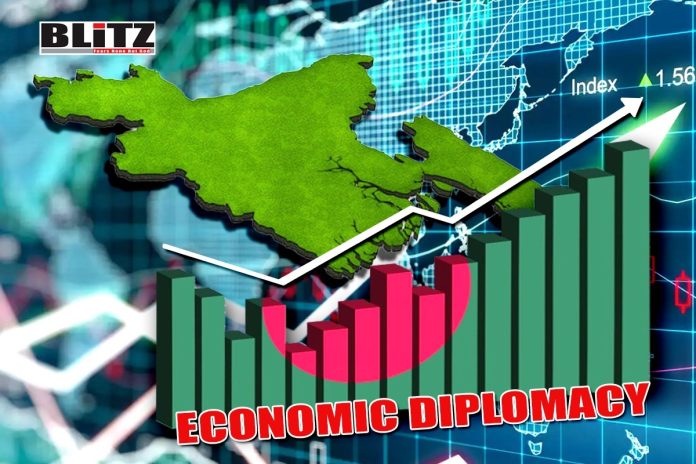Within the dynamic realm of international relations, economic diplomacy has risen to prominence as a fundamental pillar of strategic navigation for nations globally. Prime Minister Sheikh Hasina’s recent directive to Bangladeshi diplomats highlights a significant pivot, accentuating the pivotal role of economic factors in molding foreign policy agendas. This directive not only signals a recalibration on the domestic front but also mirrors a widespread recognition that economics holds unprecedented sway in decision-making spheres, overshadowing conventional political frameworks. The directive underscores a growing acknowledgment that nations must adeptly wield economic leverage to assert influence and achieve their strategic objectives on the global stage.
Economic diplomacy lies at the heart of a nation’s strategic maneuvers, harnessing its economic strength to advance wider foreign policy goals. This multifaceted approach involves skillfully navigating the complex network of global economic relations to optimize benefits in areas such as trade, investment, and technological collaboration. Unlike traditional diplomacy, economic diplomacy requires a deep grasp of financial intricacies, commercial dynamics, and regulatory landscapes, transcending conventional diplomatic boundaries to secure advantages on the global stage.
Recognizing the transformative power of economic diplomacy, Bangladesh has embarked on a strategic course to leverage economic opportunities as a cornerstone of its foreign policy framework. Since gaining independence in 1971, Bangladesh has steadily amplified its commitment to economic diplomacy, leading to a strategic realignment aimed at optimizing national interests. Through a concerted effort towards trade and investment diversification, Bangladesh has fostered strong economic partnerships with a diverse range of global actors, including influential entities such as the Kingdom of Saudi Arabia, Japan, China, and India. This deliberate emphasis on economic engagement reflects Bangladesh’s proactive stance in navigating the complex dynamics of global economics to secure its position and propel its socio-economic development on the world stage.
As Bangladesh braces for its imminent transition from a least developed country (LDC) to a developing nation by 2026, the imperative of economic diplomacy looms larger than ever. The government’s visionary roadmap, enshrined in the aspiration for a Smart Bangladesh by 2041, underscores the pivotal role of economic diplomacy in propelling the nation towards sustainable growth. In tandem with this vision, the government has unveiled a comprehensive Economic Diplomacy package, comprising initiatives aimed at bolstering foreign investment, enhancing trade diversity, fostering technological transfer, and ensuring gainful employment opportunities.
Economic diplomacy holds a pivotal role in Bangladesh’s sustainable development journey, transcending mere economic expediency. As the nation climbs the global economic ladder, adept economic diplomacy emerges as a vital tool in navigating the intricate dynamics of the international stage. Bangladesh’s rapid ascent as the fifth fastest-growing economy highlights the profound impact of strategic economic maneuvering, showcasing the symbiotic link between economic diplomacy and national advancement. This underscores the imperative for Bangladesh to continue leveraging diplomatic channels to sustain its developmental momentum and secure its place in the global economic landscape.
For economic diplomacy to be effective, Bangladesh must embrace a multifaceted strategy, combining proactive engagement with global stakeholders and domestic capacity-building initiatives. Going beyond conventional diplomatic avenues, economic diplomacy demands active participation from a wide array of stakeholders, including policymakers, business leaders, and representatives from civil society. Through the concerted efforts of these diverse actors, Bangladesh can enhance its influence on the global platform, fostering an environment conducive to sustainable economic development. This comprehensive approach ensures that Bangladesh maximizes its diplomatic endeavors, leveraging its collective strengths to navigate the complexities of international relations and secure its position in the global economic landscape.
In light of the prevailing geopolitical tumult catalyzed by events such as the Russian-Ukrainian conflict, Bangladesh’s commitment to astute economic diplomacy assumes heightened significance. As the specter of LDC graduation looms large, Bangladesh must navigate these turbulent waters with adept economic maneuvering, safeguarding its upward trajectory amidst a sea of uncertainty. By championing economic diplomacy as a cornerstone of its foreign policy ethos, Bangladesh can consolidate its position as a global economic powerhouse, driving sustainable development and prosperity for generations to come.
Economic diplomacy serves as the cornerstone of Bangladesh’s foreign policy framework, playing a crucial role in its elevation on the world stage. By embracing strategic engagement and forward-thinking initiatives, Bangladesh can unlock the transformative power of economic diplomacy, guiding its journey towards enduring growth and prosperity. With the nation on the brink of unparalleled economic advancement, the significance of economic diplomacy reverberates more strongly than ever, illuminating the pathway towards a future characterized by enhanced prosperity and opportunity. This underscores Bangladesh’s commitment to leveraging diplomatic channels to secure its position as a key player in the global economy, poised to shape its destiny on the international stage.




